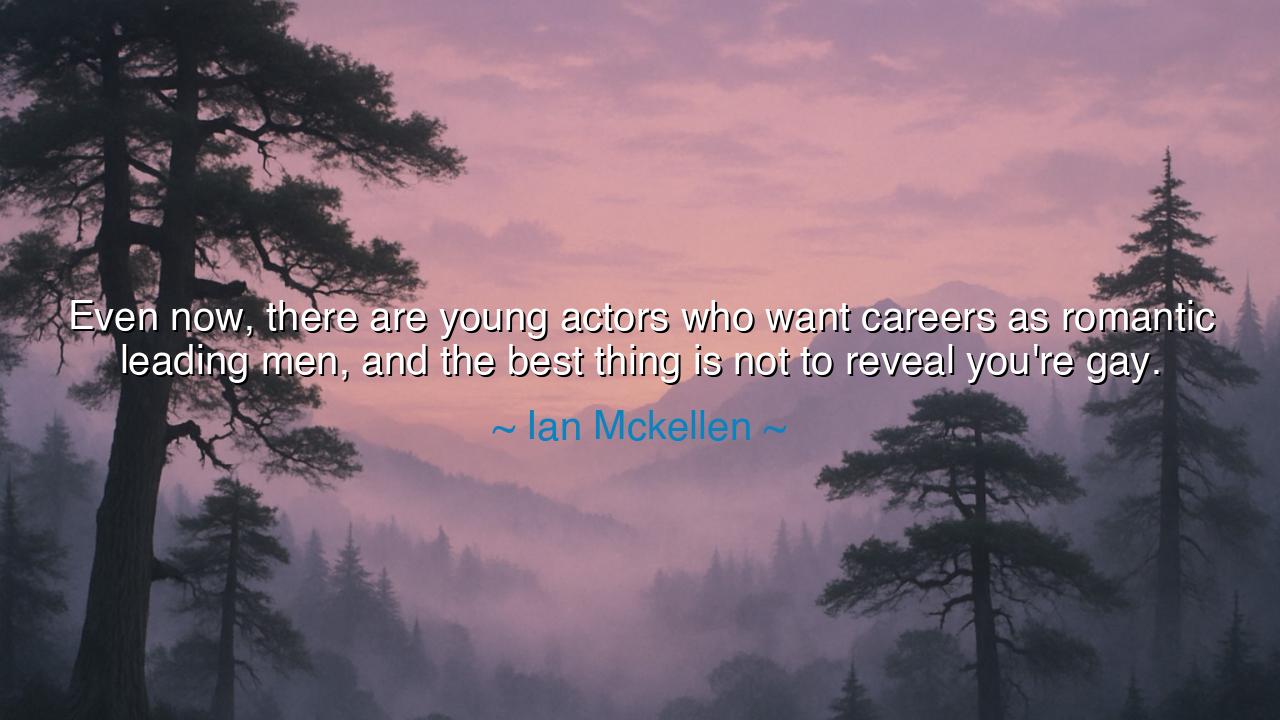
Even now, there are young actors who want careers as romantic
Even now, there are young actors who want careers as romantic leading men, and the best thing is not to reveal you're gay.






Ian McKellen, master of stage and screen and fearless voice for truth, once declared: “Even now, there are young actors who want careers as romantic leading men, and the best thing is not to reveal you’re gay.” These words are both lament and warning, for they expose the chains that prejudice still wraps around the shoulders of those who would give themselves fully to art. In them, McKellen reminds us that even in an age of progress, the shadows of fear and stigma still linger, demanding silence from those who long only to live and love in truth.
The ancients themselves wrestled with this tension between image and reality. On the stage of Athens, actors donned masks to portray kings, warriors, and lovers, yet their true selves remained hidden behind painted expressions. McKellen’s words echo this practice, though in far darker form: the mask that some actors are told to wear is not part of a role, but a disguise for their own identity. To hide being gay, to cloak one’s truth, becomes the price demanded for the chance to embody the romantic ideal before the public.
History offers many stories that mirror this burden. In the golden age of Hollywood, stars like Rock Hudson were celebrated as paragons of masculinity and desire, adored by audiences who believed the illusion of the silver screen. Yet in his private life, Hudson was forced into silence, his love hidden, his truth suppressed. It was only in the twilight of his life, through illness and suffering, that the mask was finally dropped. His story proves McKellen’s lament: that to claim the mantle of the romantic lead, society demanded denial of the self.
And yet, McKellen’s own life stands as a defiance of this false wisdom. He chose not to remain silent, but to live openly, even at the risk of his career. His courage became not only an act of personal integrity, but a beacon for younger generations, showing that truth is more enduring than illusion. Still, his words remind us that the old chains are not yet broken. The young actor, seeking success, may still hear whispers that honesty will close doors, that love must be hidden if applause is to be won.
This conflict reveals a deeper flaw in society’s understanding of art. For what is acting, if not the ability to embody that which one is not? Why should an actor’s private love disqualify him from playing the lover upon the stage? The prejudice is not against art, but against identity. It is not truth that weakens performance, but false judgment that weakens society. McKellen’s observation thus challenges us: if we believe in the power of art, we must believe that truth in life does not diminish it, but enriches it.
The lesson is profound: live not in fear of the world’s expectations, but in the strength of your truth. To those who still whisper that silence is safer, remember that silence may protect the career, but it wounds the soul. To those who watch, remember that every person before you is more than the role they play—do not demand that they bury their humanity to preserve your illusion. For love, whether straight or gay, is the most universal of human experiences, and art that springs from honesty will always burn brightest.
So I say unto you, seekers of courage: do not let the world convince you that your truth disqualifies you from greatness. Whether you are an actor on the stage of theater or simply on the stage of life, live openly, love openly, and refuse the chains of falsehood. Let us build a world where no one must hide to play the romantic lead, for the truest romance of all is the one lived without shame. And in that day, McKellen’s lament will no longer be needed, for truth itself will have taken its rightful place as the greatest role of all.






AAdministratorAdministrator
Welcome, honored guests. Please leave a comment, we will respond soon